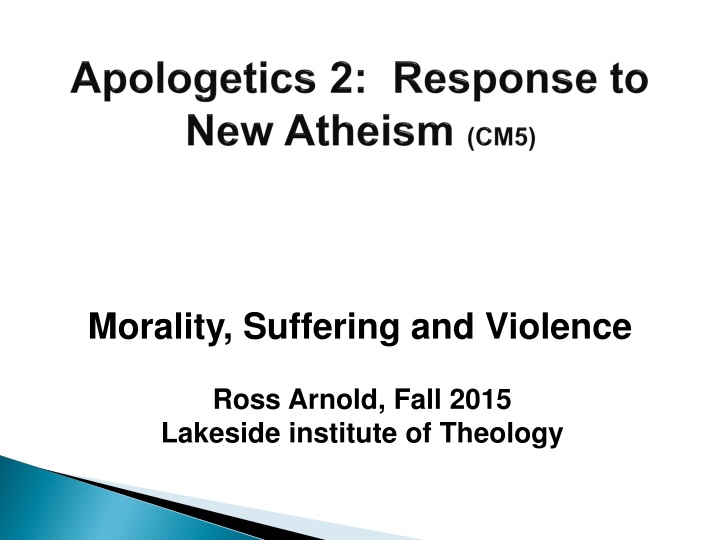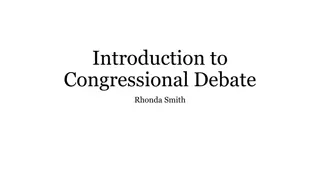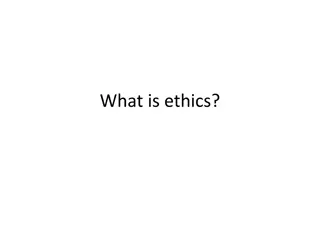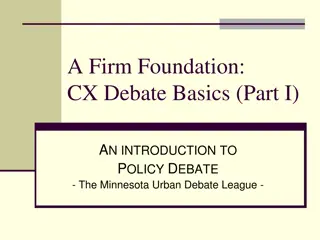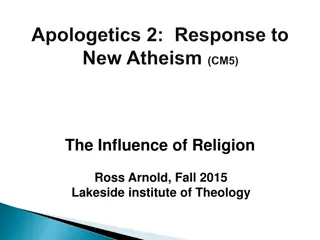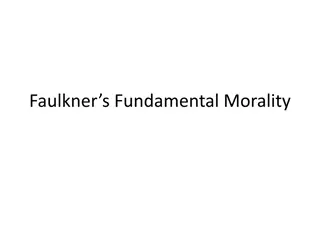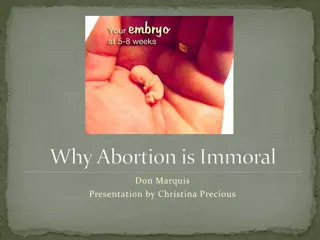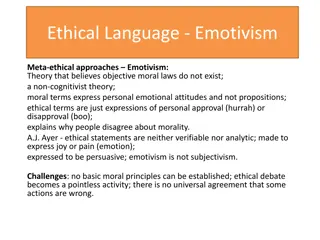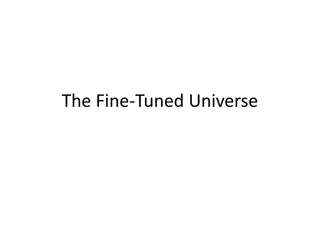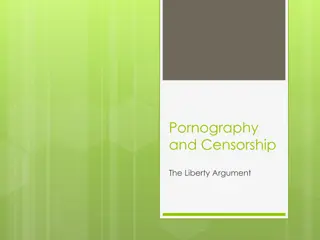The Debate on Objective Morality: The Atheistic Perspective
The discussion delves into the concept of objective morality and its relation to religious beliefs and atheism. It explores why most people believe in objective morality even though atheists argue against its existence based on evolutionary theories. The argument is centered on the existence of a higher moral law separate from individual or societal codes, challenging atheistic beliefs on moral values.
Download Presentation

Please find below an Image/Link to download the presentation.
The content on the website is provided AS IS for your information and personal use only. It may not be sold, licensed, or shared on other websites without obtaining consent from the author.If you encounter any issues during the download, it is possible that the publisher has removed the file from their server.
You are allowed to download the files provided on this website for personal or commercial use, subject to the condition that they are used lawfully. All files are the property of their respective owners.
The content on the website is provided AS IS for your information and personal use only. It may not be sold, licensed, or shared on other websites without obtaining consent from the author.
E N D
Presentation Transcript
Morality, Suffering and Violence Ross Arnold, Fall 2015 Lakeside institute of Theology
Apologetics 2 (CM5) Oct. 2 Introduction Oct. 9 Faith and Reason Oct. 16 Mid-Term Break Oct. 23 Science and Origins Oct. 30 Science and Origins 2 Nov. 6 Morality, Suffering and Violence Nov. 13 The Influence of Religion Nov. 20 Conclusion; Final Exam
Why do most rational people believe in objective morality? That is, why do people generally think that some actions are right and some actions are wrong, regardless of people s subjective opinions? Why does almost everyone agree that it is evil or wicked 1. for someone to walk into a random house, shoot everyone in it, and steal everything in sight? 2. for a man to beat and rape a kind, innocent woman? 3. for an adult to torture an innocent child for the fun of it? or 4. for parents to have children for the sole purpose of abusing them sexually? The man who says it is morally acceptable to rape little children, is just as mistaken as the man who says that 2 + 2 = 5. Atheist Michael Ruse
1. If the moral code and/or actions of any individual or society can properly be subjects of criticism (as to real moral wrong), then there must be some objective standard (some higher law ) which is other than the particular moral code and which has an obligatory character which can be recognized. 2. The moral code and/or actions of any individual or society can properly be subjects of criticism (as to real moral wrong). 3. Therefore, there must be some objective standard (some higher law ) which is other than the particular moral code and which has an obligatory character which can be recognized. Or, stated as a logical argument for God Premise 1: If God does not exist, then objective moral values do not exist. Premise 2: Objective moral values exist. Conclusion: God exists.
But how can an atheist logically call something atrocious, deplorable, evil, or wicked, since according to atheism man is nothing but matter in motion, no different than any other of the animals from which we evolved? My object in this chapter is solely to show that there is no fundamental difference between man and the higher mammals in their mental faculties. Charles Darwin [T]he basic implication of the atheistic system does not allow objective moral right or objective moral wrong. Anthony Flew Man is the result of a purposeless and materialistic process that did not have him in mind [g]ood and evil, right and wrong, concepts irrelevant in natureexcept from the human viewpoint, become realand pressing features of the whole cosmos as viewed morally because morals arise only in man. Atheist evolutionist George Gaylord Simpson
The New Atheists claim that God is not necessary for morality; that we can be good without God. They insist that the Bible is primitive, unacceptable, morally abhorrent, and that religious breeds evil. Finally, and most importantly Dawkins is engaged on a moral crusade, not as a philosopher trying to establish premises and conclusions but as a preacher, telling the ways to salvation and to damnation. The God Delusion is above all a work of morality. Michael Ruse We can no longer base our ethics on the idea that human beings are a special form of creation made in the image of God, singled out from all other animals, and alone possessing an immortal soul. Why should we believe that the mere fact that a being is a member of the species Homo Sapiens endows its life with some unique, almost infinite value? Peter Singer
If God does not exist, everything is permissible. Our sense of beauty and our religious instinct are tributary forms in helping the reasoning faculty towards its highest achievements. You are right in speaking of the moral foundations of science, but you cannot turn round and speak of the scientific foundations of morality. Every attempt to reduce ethics to scientific formulae must fail. Even the greatest forces and abilities don t seem to carry any clear instructions on how to use them. As an example, the great accumulation of understanding as to how the physical world behaves only convinces one that this behaviour has a kind of meaninglessness about it. The sciences do not directly teach good or bad. Ethical values lie outside the scientific realm. Fyodor Dostoievski Albert Einstein Richard Feynman It is pretty hard to defend absolute morals on anything other than religious grounds. Science has no methods for deciding what is ethical. Richard Dawkins
David Hume and the Is to Ought problem. We simply must stand somewhere. I am arguing that, in the moral sphere, it is safe to begin with the premise that it is good to avoid behaving in such a way as to produce the worst possible misery for everyone. Sam Harris How do we know that the morally right act is, as Harris posits, the one that does the most to increase well-being, defined in terms of our conscious states of mind? Has science really revealed that? If it hasn t, then the premise of Harris all-we-need-is-science argument must have non-scientific origins. Kwame Anthony Appiah I don t think Harris criterion that we can use science to justify maximizing the well-being of individuals is valid. We can t. We can certainly use science to say how we can maximize well-being, once we define well-being although even that might be a bit more slippery than he portrays it. Harris is smuggling in an unscientific prior in his category of well-being. Biologist P.Z. Myers
To use Myers formulation, we must smuggle in an unscientific prior to justify any branch of science. If this isn t a problem for physics, why should it be a problem for a science of morality? Can we prove, without recourse to any prior assumptions, that our definition of physics is the right one? No, because our standards of proof will be built into any definition we provide. Sam Harris But if the unscientific prior is a MORAL assumption, then Harris cannot claim to deduce morality from science. And by the same token, Harris then cannot rule out the prior assumption of God.
To use Myers formulation, we must smuggle in an unscientific prior to justify any branch of science. If this isn t a problem for physics, why should it be a problem for a science of morality? Can we prove, without recourse to any prior assumptions, that our definition of physics is the right one? No, because our standards of proof will be built into any definition we provide. Sam Harris But if the unscientific prior is a MORAL assumption, then Harris cannot claim to deduce morality from science. And by the same token, Harris then cannot rule out the prior assumption of God.
In a universe of blind physical forces and genetic replication, some people are going to get hurt, other people are going to get lucky and you won t find any rhyme or reason in it, nor any justice. The universe we observe has precisely the properties we should expect of there is, at the bottom, no design, no purpose, no evil and no good. Nothing but blind, pitiless indifference. DNA neither knows nor cares. DNA just is. And we dance to its music. R. Dawkins We are survival machines robot vehicles blindly programmed to preserve the selfish molecules known as genes. Richard Dawkins We are built as gene machines but we have the power to turn against our creators. We, alone on the earth, can rebel against the tyranny of the selfish replicators. Richard Dawkins For an understanding of modern man, we must begin by throwing out the gene as the sole basis of our ideas on evolution. R.Dawkins
Premise 1: If God does not exist, then everything is permitted. Premise 2: If naturalistic science is true, then God does not exist. Conclusion: If naturalistic science is true, then everything is permitted. Yet the New Atheists (unlike HARD atheists such as Friedrich Nietzsche, Jean Paul Sartre and Albert Camus) do not deny the real existence of objective morality but instead struggle to try to explain it within a naturalistic paradigm. But if DNA is all we really are, and DNA neither knows nor cares about values, and we dance to DNA s music how is it that people DO both know and care about good and evil? Where, after all, is the delusion?
No one takes their morality from the Bible. Richard Dawkins Universalistic egalitarianism, from which sprang the ideals of freedom and a collective life in solidarity, the autonomous conduct of life and emancipation, the individual morality of conscience, human rights and democracy, is a direct legacy of the Judaic ethic of justice and the Christian ethic of love. This legacy, substantially unchanged, has been the object of continual critical appropriation and reinterpretation. To this day, there is no alternative to it. And in light of the current challenges of a post-national constellation, we continue to draw on the substance of this heritage. Everything else is just idle post-modern talk. Jurgen Habermas
